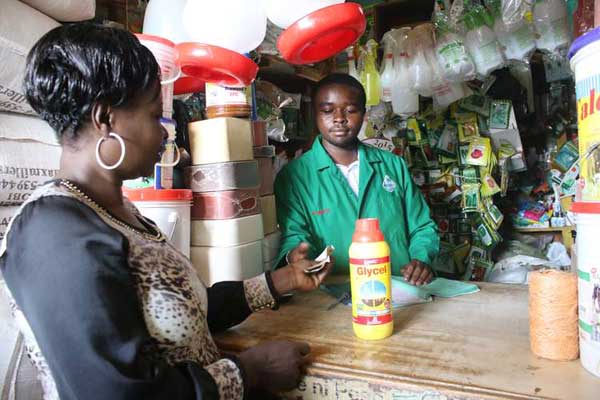Joe Mukundi runs an agrovet business in Runyenjes Embu. He inherited the agrovet from his father and pumped in Sh. 250, 000 capital. Out of this, Sh. 150, 000 was from his savings and the rest was soft loans from friends.
Three years after taking over the business, Mukundi juggled school and the business named Muwa Agro-Tech, which his father Kenneth Mugendi, who died in 2005 and was a trained animal health personnel, started.
“When my father died, I was still young. My mother took over the running of the shop, which then was at Kanja market center. I was helping her all along but after attaining a Certificate in Agriculture from MUST in 2013 and later a diploma in the same course, I took over the management in 2014 then moved the shop to Runyenjes,” he says.
To start the shop, Mukundi says that one needs a county business permit and certifications from the Pest Control and Products Board (PCPB), the Kenya Veterinary Board and Kenya Plant Health Inspectorate Service (KEPHIS).
“Certificates from these organizations should always be displayed in your shop to give your customers confidence that they are buying from a trusted agrovet,” says Mukundi. His agrovet is one of the most popular agrovets in the town.
“I sell agro-chemicals, feeds, supplements, fertilizers, pumps and other equipment,” he explains, cautioning farmers the chemicals and fertilizers should not be exposed to direct sunlight as this is likely to reduce their effectiveness.
The different products must also be arranged in a manner that avoids contamination. And he has ensured this by opening two additional stores to keep pesticides, agro-chemicals and feeds.
“It is a lucrative business, but one can easily make mistakes like stocking fake goods and products. It is important to source drugs from stores certified and recognized government institutions such as KEPHIS.”
George Mulala: Why acquiring a house and land were bad decisions
From his agrovet business, he has been able to employ 4 employees, one of them having a certificate in veterinary medicine. In good seasons, the business has brought in as much as Sh. 200,000 in gross profits. The business also fully paid for his Bachelor of Science in Agriculture degree studies at the Meru University of Science and Technology (MUST).
“Running an agrovet business has its highs and low. Profits are high during the planting season when farmers buy seeds and chemicals in plenty and when they harvest. In between is almost a dry season. This business is also capital intensive and great caution has to be taken when dealing with different products.
It is also not easy to introduce farmers to new products, thus, some products may expire before they are sold.”
“That is why you will find many agrovets not stocking products from several manufacturers. However, with the emergence of new pests and diseases, farmers are embracing modernized pesticides as a way of dealing with such,” he recounts.
As a way of appreciating his customers, Mukundi teams up with a local veterinary organization to hold open field days where farmers are educated on crops and animal management.
Joe Mukundi emerged third in the 2015 National Farmers Awards Scheme, small-scale agro-input category, a competition organized by Elgon Kenya and Ministry of Agriculture.
“I received the award for being able to adequately address farmers’ needs and properly dispense chemicals and drugs to them,” he says.










